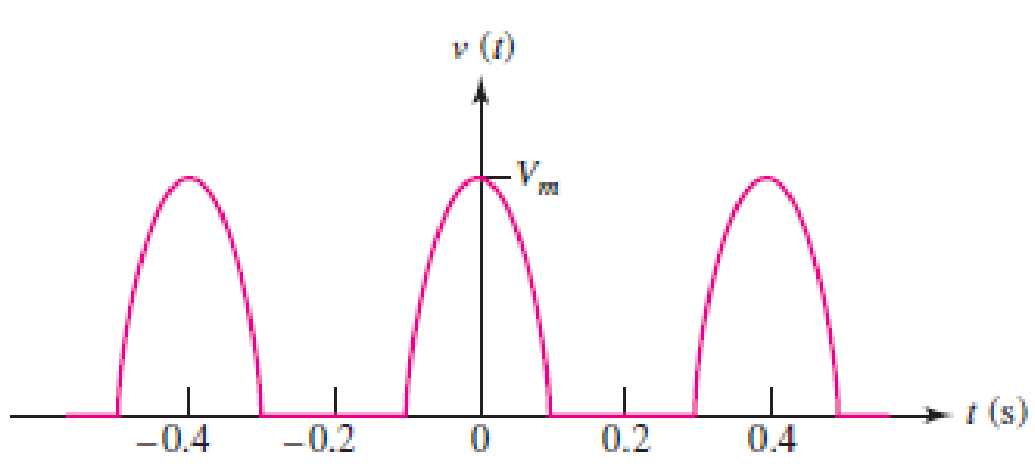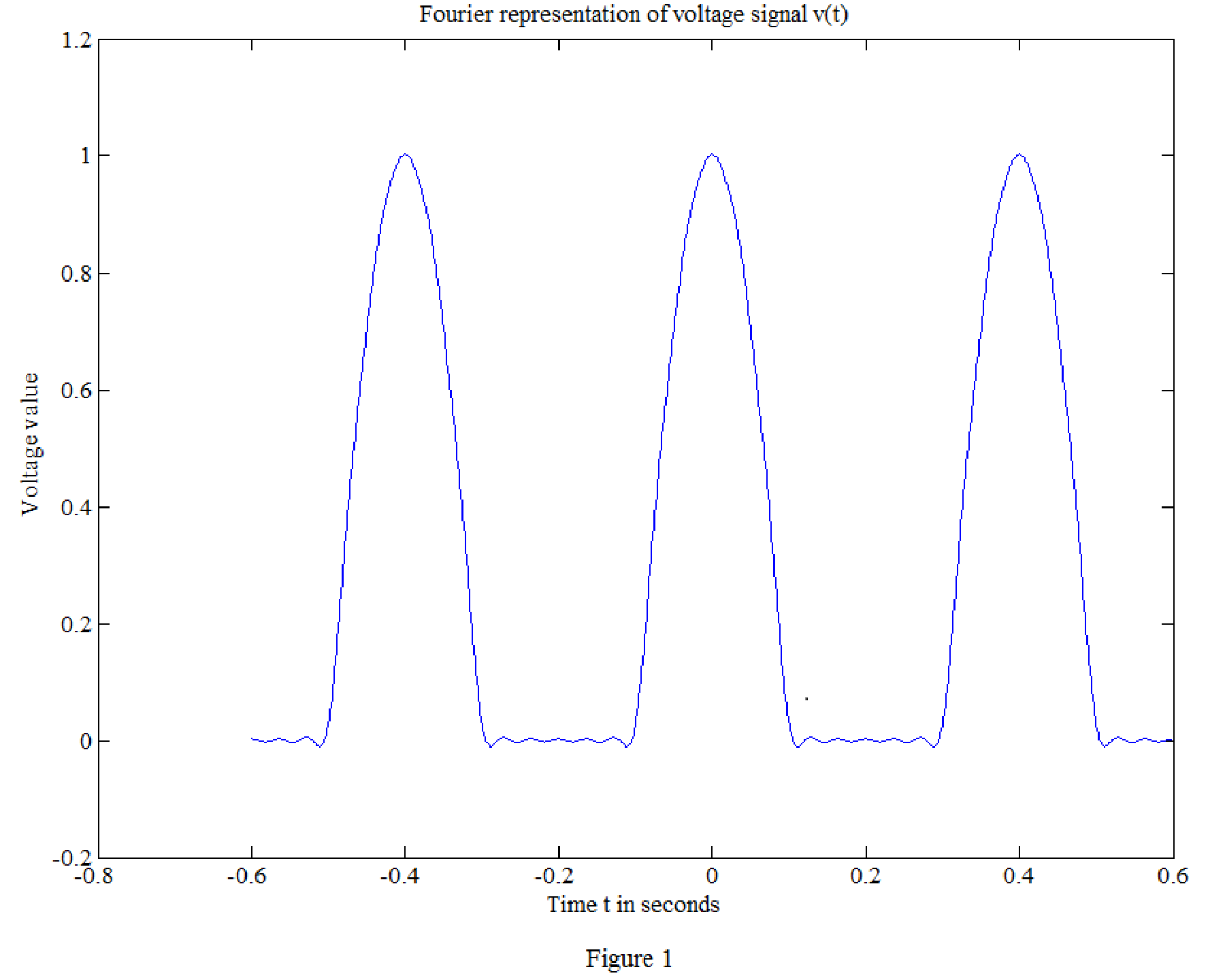
Concept explainers
A “half-sinusoidal” waveform is shown in Fig. 17.31, which is the output of a half-wave rectifier used to help convert a sinusoidal input to dc. Find the Fourier series representation and plot the signal and Fourier series representation for n = 10 terms.

■ FIGURE 17.31
Find the Fourier series coefficients
Answer to Problem 11E
The values of the Fourier series coefficients
Explanation of Solution
Given data:
Refer to Figure 17.31 in the textbook.
Formula used:
Write the general expression for Fourier series expansion.
Write the general expression for Fourier series coefficient
Write the general expression for Fourier series coefficient
Write the general expression for Fourier series coefficient
Write the expression to calculate the fundamental angular frequency.
Here,
Calculation:
In the given Figure 17.31, the time period is
The function
Substitute 0.4 for T in equation (5) to find
Applying equation (6) in equation (2) to find
Simplify the above equation as follows,
For half wave symmetry and even symmetry,
For all values of ‘n’,
Applying equation (6) in equation (3) to find the value of coefficient
Consider the function,
Consider,
On differentiating the above expression,
Equation (8) will be follows,
In the above equation, consider,
By applying linearity,
In equation (10),
consider,
Let,
Equation (11) will be as follows,
Similarly, in equation (10),
consider,
Let,
Equation (12) will be as follows,
Substitute the values of m and l in equation (10) as follows,
Substitute the value of y in equation (9) as follows,
Therefore,
On applying the limits,
Simplify the equation as follows,
Simplify the equation as follows,
Substitute the value of
Substitute the value of
Representing through
By considering
Matlab code for the signal
t=linspace(-0.6,0.6,1000); % vector for time over 1000 points.
Vm=1;
v0=Vm/(pi); % constant.
for i=1:1000;
sum=0;
sum=sum+ 0.5*cos(5*pi*t(i)) + (2/(3*pi))*cos(10*pi*t(i)) - (2/(15*pi))*cos(20*pi*t(i)) + (2/(35*pi))*cos(30*pi*t(i)) - (2/(63*pi))*cos(40*pi*t(i)) + (2/(99*pi))*cos(50*pi*t(i));
vt(i)=v0+sum;
end
plot(t,vt)
xlabel('Time t in seconds')
ylabel('Voltage value')
title('Fourier representation of voltage signal v(t)')
Matlab output:
The Fourier representation of voltage signal

Conclusion:
Thus, the values of the Fourier series coefficients
Want to see more full solutions like this?
Chapter 17 Solutions
Loose Leaf for Engineering Circuit Analysis Format: Loose-leaf
Additional Engineering Textbook Solutions
ELECTRICITY FOR TRADES (LOOSELEAF)
Principles Of Electric Circuits
ANALYSIS+DESIGN OF LINEAR CIRCUITS(LL)
Electronics Fundamentals: Circuits, Devices & Applications
Fundamentals of Electric Circuits
Microelectronics: Circuit Analysis and Design
- Q1/Obtain the Fourier Transform to the rectangular pulse of duration 2 second and having a magnitude of 10 volts. 2/Find the Fourier series for the periodic function giving below: x (t) (cosx, 0, {cos 0 <x <1 T <x <2Tarrow_forwardObtain the Fourier series expansion of the periodic function f(t) of period 2π defined by the given. Show your solution.arrow_forwardDetermine the Fourier series representation of the following discrete time signal x(n) = {..... , 1, 2, -3,1,2,-3,1,2,-3,......} (Hint: This is periodic signal)arrow_forward
- 950. Given a zero-centered hat function of height 3 volts and width 20.0 ms, determine the Fourier transform evaluated at f=0.5300 Hz. X_bar(f) is a complex function: amplitude X(f) and angle part.arrow_forwardConsider the following discrete time signal periodic with N?[?]=1+sin(2??)?+3cos(2??)?+cos(4???+?2)Find the Fourier series representation of ?[?], i.e. find the Fourier series coefficients ?0, ?−1, ?1, ?−2 and ?2.arrow_forwardLet's examine the function g(t)= {Go for -π < t < -(π/2), {-Go for -(π/2) < t < (π/2), {Go for (π/2) < t < π, which is characterized by being 2π-periodic. Sketch the g(t) graph within the range of [-4π,4π]. Then, express the Fourier expansion of g(t). Finally, Plot using the first 3, 5, 10, 15, 20, and 25 terms of the series and tell at what point the graph starts resembling your initial sketch.arrow_forward
- The discrete time periodic signal x(n)={2,1,-4,2} has the Fourier coefficients given as ck=(c-8,c-7,c-6,6-j,c-4,c-3,-5,c-1,c0,c1,-5,6-j) .Find the missing coefficients and plot its magnitude spectrum for -8≤k≤3.arrow_forwarda. Which of the following is true? The Fourier transform of a unit rectangular pulse is A. real. B. not oscillating. C. complex. D. neither real nor complex. b. Which of the following is true? For system and signal operations, the symbol “*” is typically shared between A. convolution and complex conjugate. B. linear combination and complex conjugate. C. orthogonality and complex conjugate. D. multiplication and complex conjugate. c. Which of the following is true? The Fourier transform is based on A. The Fourier series by substituting the signal x(t) into Fourier coefficient’s expression. B. The Fourier series by substituting the Fourier coefficient’s expression into a random signal which is periodic over a defined period. C. The Fourier series by substituting the Fourier coefficient’s expression into x(t). D. The Fourier series because this is a logical process.arrow_forwardFourier transform of Triangular signal where, f(t) = t, 0<t<1 and period is equals to 2arrow_forward
- Let's examine the function g(t)= {Go for - π < t < -( π/2), {-Go for -( π/2) < t < ( π/2), {Go for ( π/2) < t < π, which is characterized by being 2 π-periodic. Firstly, without mathematical calculations, clarify why every bn value must be 0. Secondly, sketch the g(t) graph within the range of [-4 π,4 π]. Thirdly, express the Fourier expansion of g(t). Lastly, plot the g(t) using the first 3, 5, 10, 15, 20, and 25 terms of the series. At what point does the graph start resembling your initial sketch in the first question?arrow_forward1- Which one of the following pair of antennas are functionally same. a- Parabolic reflector and lense antenna b- Array & parabolic reflector antenna c- Aperture and Parabolic reflector antenna d- None of the above. 2- Inverse Fourier transform on Maxwell's equation is to transform signal from frequency domain to time domain. true or falsearrow_forwardIf x[n] is input to a discrete time LTI system with impulse response h[n], find the Fourier series coefficients for the output y[n], where in the imagearrow_forward
 Introductory Circuit Analysis (13th Edition)Electrical EngineeringISBN:9780133923605Author:Robert L. BoylestadPublisher:PEARSON
Introductory Circuit Analysis (13th Edition)Electrical EngineeringISBN:9780133923605Author:Robert L. BoylestadPublisher:PEARSON Delmar's Standard Textbook Of ElectricityElectrical EngineeringISBN:9781337900348Author:Stephen L. HermanPublisher:Cengage Learning
Delmar's Standard Textbook Of ElectricityElectrical EngineeringISBN:9781337900348Author:Stephen L. HermanPublisher:Cengage Learning Programmable Logic ControllersElectrical EngineeringISBN:9780073373843Author:Frank D. PetruzellaPublisher:McGraw-Hill Education
Programmable Logic ControllersElectrical EngineeringISBN:9780073373843Author:Frank D. PetruzellaPublisher:McGraw-Hill Education Fundamentals of Electric CircuitsElectrical EngineeringISBN:9780078028229Author:Charles K Alexander, Matthew SadikuPublisher:McGraw-Hill Education
Fundamentals of Electric CircuitsElectrical EngineeringISBN:9780078028229Author:Charles K Alexander, Matthew SadikuPublisher:McGraw-Hill Education Electric Circuits. (11th Edition)Electrical EngineeringISBN:9780134746968Author:James W. Nilsson, Susan RiedelPublisher:PEARSON
Electric Circuits. (11th Edition)Electrical EngineeringISBN:9780134746968Author:James W. Nilsson, Susan RiedelPublisher:PEARSON Engineering ElectromagneticsElectrical EngineeringISBN:9780078028151Author:Hayt, William H. (william Hart), Jr, BUCK, John A.Publisher:Mcgraw-hill Education,
Engineering ElectromagneticsElectrical EngineeringISBN:9780078028151Author:Hayt, William H. (william Hart), Jr, BUCK, John A.Publisher:Mcgraw-hill Education,





